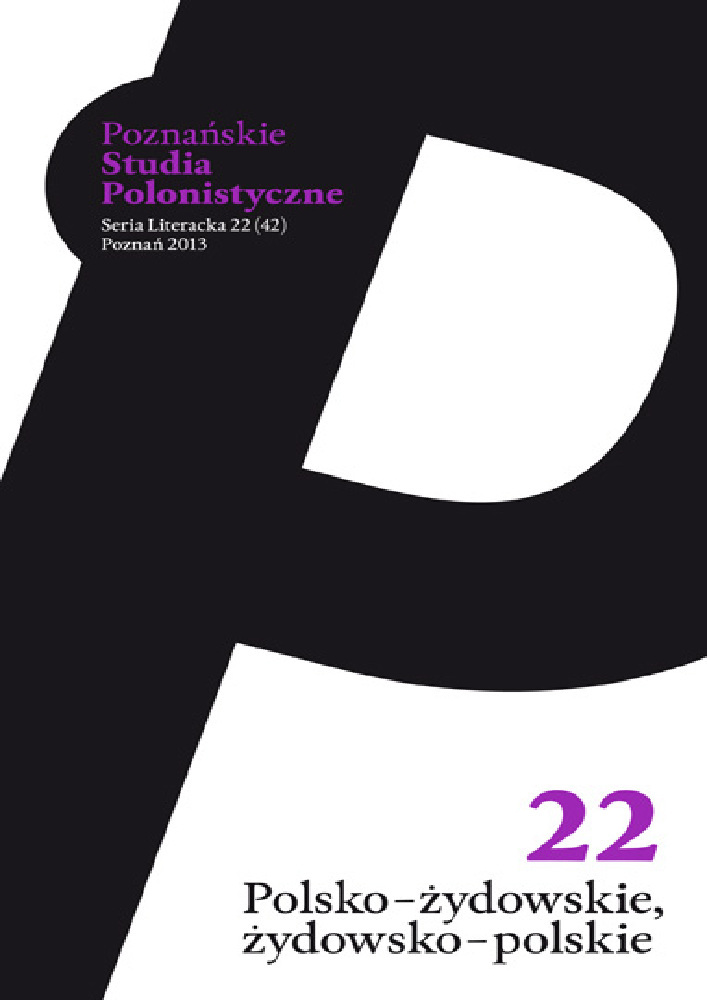Abstract
The article is a reaction to the second edtion of Józef Czechowicz’s Letters (2011), which the author compares to the first edition (1977). It turns out that the poet’s letters, when they went through censorship screening in the 1970s, were purged not only of politically charged passages, where he mentions Miłosz, Czuchnowski, Iwaniuk, and Łobodowski, as well as the critical passages about Marxism, but also his remarks about Jews, remarks that were mostly antisemitic and stereotypical. The analysis of these passages is confronted with Czechowicz’s photographs of the Jewish quarter in Lublin and with the “Jewish traces” in his poetry. Above all, however, the discussion focuses on the language of violence, exposed in the poem śmierć [death] in the volume called dzień jak co dzień. The poem has been interpreted polemically, in opposition to Jacek Leociak, who reads śmierć both figuratively and as a text about a slaughterhouse. In this way, unexpected dimensions of Czechowicz’s sensitivity are shown, as the poet understands the cruelty of modern “animal killing industry” (used by the designers of the Holocaust machine), while at the same time he uses a dangerous array of antisemitic stereotypes, which were previously unknown to his critics.Funding
Narodowe Centrum Nauki.
References
Agamben G., Homo sacer. Suwerenna władza i nagie życie, przeł. M. Salwa, posłowie P. Nowak, Warszawa 2008.
Całbecki M., Awangarda – nowoczesność – przygodność. Dialektyka nowoczesności w poezji Józefa Czechowicza, „Pamiętnik Literacki” 2012, z. 2.
Całbecki M., Dwa miasta w poezji Józefa Czechowicza, „Kresy” 2000, nr 1.
Całbecki M., Miasta Józefa Czechowicza. Topografia wyobraźni, Lublin 2004.
Czechowicz J., Bez nieba, w: idem, Pisma zebrane, t. 3: Utwory dramatyczne, red. J. Nowakowska, J. Cymerman, Lublin 2011.
Czechowicz J., My chcemy bliźnich, w: idem, Szkice literackie, oprac. T. Kłak, Lublin 2011.
Czechowicz J., Pisma zebrane, t. 1: Wiersze i poematy, oprac. J.F. Fert, Lublin 2012.
Czechowicz J., Z dziennika 1926, w: idem, Koń rydzy. Utwory prozą, oprac. T. Kłak, Lublin 1990.
Döblin A., Berlin. Alexanderplatz, przeł. I. Czermakowa, Warszawa 1959.
Dworak T., Norwid, Rittner i… Czechowicz, „Myśl Narodowa” 1939, nr 8.
Fedorowicz M., Kiszka A., Skrzypek M., Zętar J., Czechowicz jako fotograf, „Scriptores” 2008, nr 32: Czechowicz – w poszukiwaniu ukrytego miasta, t. 3.
Karłowicz J., Kryński A., Niedźwiedzki W., Żyd [hasło], w: Słownik języka polskiego, t. 8: Z-Ż, Warszawa 1927.
Kłak T., Nad listami Czechowicza, w: J. Czechowicz, Listy, oprac. T. Kłak, Lublin 2011.
Kołodziejczyk E., Czechowicz – najwyżej piękno, Kraków 2006.
Krall H., Wyjątkowo długa linia, Kraków 2004.
Kryszak J., Józefa Czechowicza wstąpienie w mit (na emigracji), w: Józef Czechowicz od awangardy do nowoczesności, red. J. Święch, Lublin 2004.
Kuczyńska-Koschany K., Wymazywanie. Eufemizm wobec Zagłady (preliminaria), w: O historyczności, red. K. Meller, K. Trybuś, Poznań 2006.
Levi P., Czy to jest człowiek, przeł. H. Wiśniowska, Kraków 1978.
Marciniak J., Pozostał tylko krzak bzu…, Poznań 2004.
Osadczy W., Święta Ruś. Rozwój i oddziaływanie idei prawosławia w Galicji, Lublin 2007.
Pachocki D., Uwagi wydawcy, w: J. Czechowicz, Pisma zebrane, t. 4: Proza, red. T. Kłak, Lublin 2005.
Panas W., Dwadzieścia dwie litery. O „Poemacie” Józefa Czechowicza uwagi wstępne, w: Czytanie Czechowicza, red. P. Próchniak, J. Kopciński, Lublin 2003.
Panas W.,Oko Cadyka. Fragmenty, „Scriptores” 2009, nr 37: Panas. Lublin jest księgą, t. 2.
Polski słownik judaistyczny, t. 2, oprac. Z. Borzymińska, R. Żebrowski, Warszawa 2003.
Przyboś J., O Józefie Czechowiczu, „Nowa Kultura” 1955, nr 36.
Przyboś J., Spór, ale nie o Czechowicza, „Nowa Kultura” 1955, nr 42.
Przymuszała B., Spory o godność w dyskursie holokaustowym, „Polonistyka” 2012,
nr 8.
Śpiewak J., Bronię nuty człowieczej, „Nowa Kultura” 1955, nr 40.
„Scriptores” 2006, nr 30: Czechowicz – w poszukiwaniu ukrytego miasta, t. 1.
„Scriptores” 2008, nr 32: Czechowicz – w poszukiwaniu ukrytego miasta, t. 3: Mapa miejsc – teksty.
Wiegandt E., „Po”, w: eadem, Niepokoje literatury. Studia o prozie polskiej XX wieku, Poznań 2010.
Witan J., Janusowa twarz poety (II), „Przegląd Humanistyczny” 1971, nr 5.
Zagajewski A., Wyobraźnia – siódmy kontynent, „Kultura” (Paryż) 1983, nr 10.
Zagórski J., Tom Józefa Czechowicza, „Życie Literackie” 1955, nr 50.
License
Authors
Authors of texts accepted for publication in „Poznańskie Studia Polonistyczne. Seria Literacka” are required to complete, sign and return to the editor's office the Agreement for granting a royalty-free license to works with a commitment to grant a CC sub-license.
Under the agreement, the authors of texts published in „Poznańskie Studia Polonistyczne. Seria Literacka” grant the Adam Mickiewicz University in Poznań a non-exclusive, royalty-free license and authorize the use of Attribution-NoDerivatives 4.0 International (CC BY-ND 4.0)Creative Commons sub-license.
The authors retain the right to continue the free disposal of the work.
Users
Interested Internet users are entitled to use works published in „Poznańskie Studia Polonistyczne. Seria Literacka” since 2016, for non-commercial purposes only, under the following conditions:
- attribution - obligation to provide, together with the distributed work, information about the authorship, title, source (link to the original work, DOI) and the license itself.
- no derivatives - the work must be preserved in its original form, without the author's consent it is not possible to distribute the modified work, such as translations, publications, etc.
Copyrights are reserved for all texts published before 2016.
Miscellaneous
Adam Mickiewicz University in Poznań retains the right to magazines as a whole (layout, graphic form, title, cover design, logo etc.).
